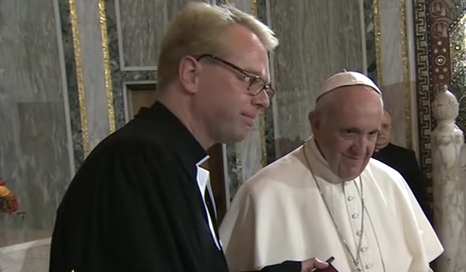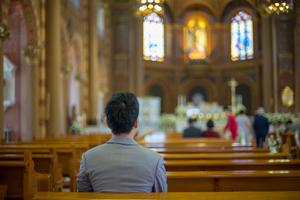Finnish Catholic Spokesman: Communion for Lutherans at the Vatican Was a Mistake

The distribution of Holy Communion to a group of Finnish Lutherans in St. Peter’s basilica last week was a mistake and not a sign that the Church is changing its practice on access to the Sacraments, a spokesman for the Finnish Catholic Church has asserted.
In a statement issued Jan. 20, Marko Tervaportti, director of the Catholic Information Centre in Helsinki, stressed that only members of the Catholic Church “in a state of grace” may receive the Eucharist, with some “special exceptions”.
Tervaportti was referring to reports last week that a Lutheran group from Finland, led by their bishop, Samuel Salmi of Oulu, had received Holy Communion in St Peter’s basilica, despite indicating to the priests present that they were ineligible to do so. According to Finnish news agency Kotimaa, the priests celebrating the Mass were aware that they were Lutherans.
In his statement, Tervaportti rejected talk of a “new ecumenical attitude” at the Vatican, reiterating that the Church’s doctrine and practice in this regard “has not changed in recent years and decades”, and if it does change, it will do so through “alteration of Church law and additions to teachings.”
He also said a so-called “new mindset” of Pope Francis “is not a sign that the Catholic Church is going to change its practice with regard to the distribution of the Holy Eucharist,” but rather it is a “sign” for Catholics to be more careful in examining their conscience.
“For Catholics the Eucharist is the ‘source and summit’ of our Christian life,” Tervaportti explained. “It is, as it were, our credo. We carefully prepare to receive it, and confess our serious sins and fast (even shortly) before receiving it.
“We adjust our lives so that we might receive the Lord’s Supper worthily,” he continued, “knowing that ‘Therefore whoever eats the bread or drinks the cup of the Lord in an unworthy manner, shall be guilty of the body and the blood of the Lord’ (1. Cor. 11:27).”
He said “not every person distributing the Holy Eucharist knows every point of teaching and practice of the Church” and so “mistakes” can happen.
But he said “creating communion” between the churches “on one’s own authority” makes the “true efforts of the churches to draw closer more challenging.” It would therefore “be good to respect the approach of each church in this matter,” he concluded.


















